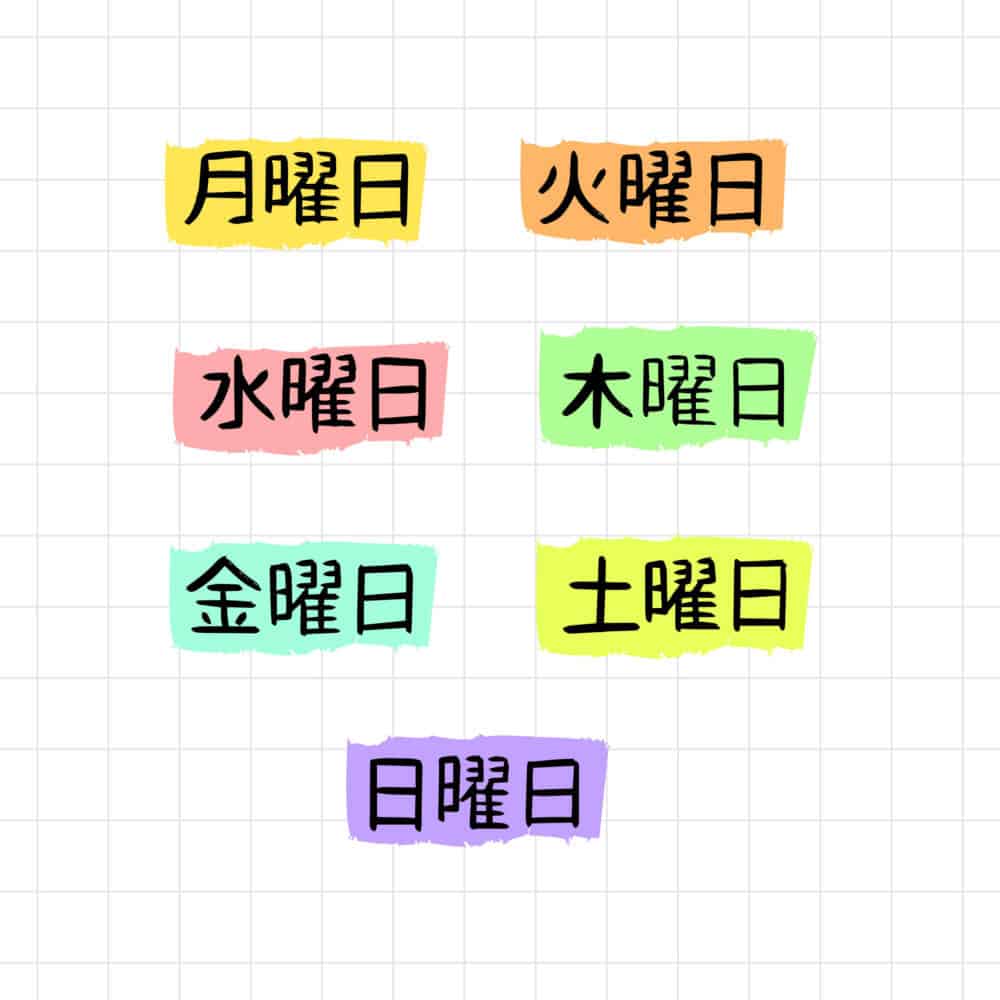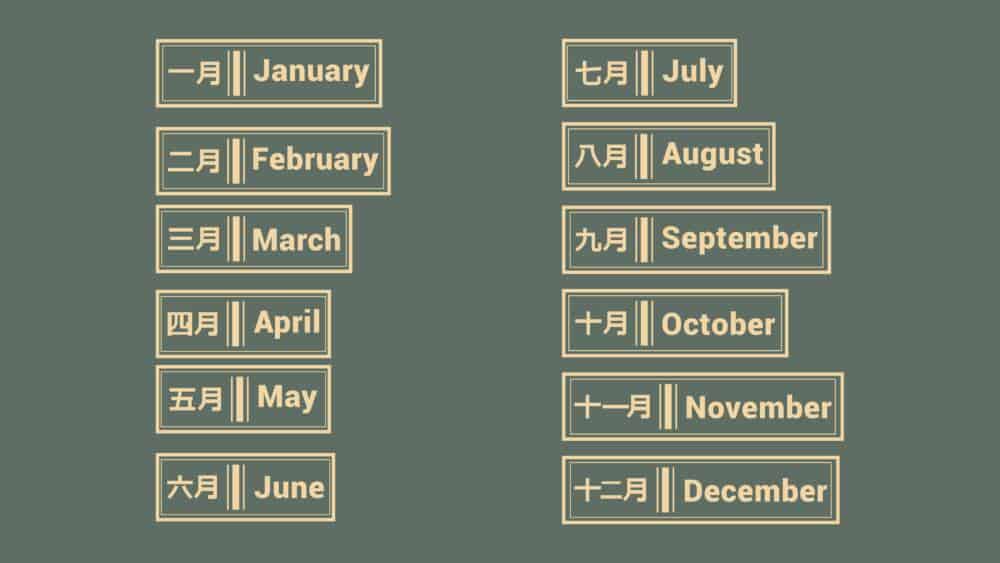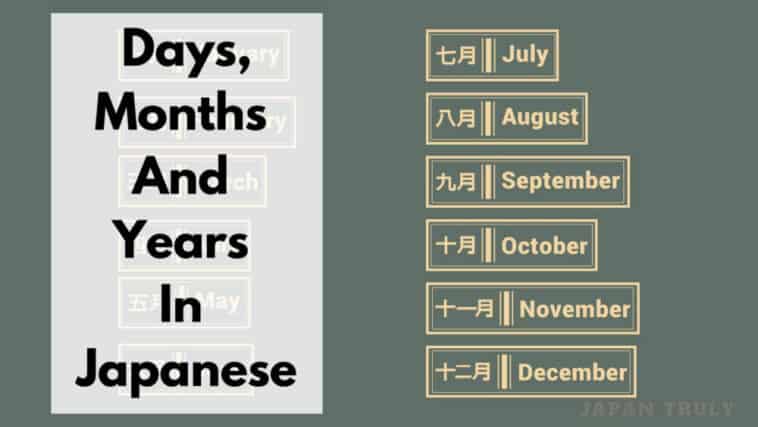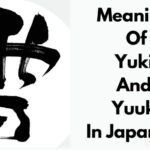Want to learn the days, months and years in Japanese? Here’s a full guide on how to say the different days, months and years in Japanese. Check it out!
Mastering dates in Japanese unlocks smoother communication. This guide unravels the simple system for days (think numbers!), unique pronunciations for months (watch out for April!), and how years can be expressed in two ways. Get ready to impress your Japanese friends!
How To Say Days, Months And Years In Japanese
How to say days of the week in Japanese?
You might be wondering what the days of the week do here when this article is primarily about dates, months and years in Japanese, but perhaps it is good if someone starts from the basics. The names of the days of the week come from the five planets or the five elements of life.

A ‘day’ in Japanese is called ‘yôbi’ and every day is followed by this word in Japanese
- 日曜日 nichi-yôbi: Sunday (“Day of the Sun”)
- 月曜日 getsu-yôbi: Monday (“Day of the Moon”)
- 火曜日 ka-yôbi: Tuesday (“Day of Fire”)
- 水曜日 sui-yôbi: Wednesday (“Day of Water”)
- 木曜日 moku-yôbi: Thursday (“Day of Wood”)
- 金曜日 kin-yôbi: Friday (“Day of Gold”)
- 土曜日 do-yôbi: Saturday (“Day of the Earth”)

How to say the dates in Japanese?
Of course the Japanese write the numbers from 1 to 31 when mentioning a date, but the ideograms in Japanese are written in a different way. Every date is succeeded by the term ‘nichi’ which means sun and day.
Here is a table that will give you a fair idea of how the numbers in Japan are actually written. The ones with ‘nichi’ are how they are transliterated in Japanese and the writing is of the Japanese script.
| READING OF IDEOGRAMS | WRITING |
| ichi nichi | 一日 |
| ni nichi | 二日 |
| san nichi | 三日 |
| shi / yon nichi | 四日 |
| go nichi | 五日 |
| roku nichi | 六日 |
| nana nichi | 七日 |
| hachi nichi | 八日 |
| kyu nichi | 九日 |
| juu nichi | 十日 |
| juu ichi nichi | 十一日 |
| juu ni nichi | 十二日 |
| juu san nichi | 十三日 |
| juu yon nichi | 十四日 |
| juu go nichi | 十五日 |
| nii ju nichi | 二十日 |
| nii ju yon nichi | 二十四日 |
| nii ju go nichi | 二十五日 |
| san juu nichi | 三十日 |
| san juu ichi nichi | 三十一日 |
How do you write the date in Japanese?
It is not like the American or the European style of writing, as mentioned earlier, the Japanese have a unique style of doing everything, even the sequence of the date counts.
But just like the date and month, the year is written in the same way in Japanese. The year is associated with the word nen which genuinely means year in Japanese. For instance, if someone has to write a date, say 2nd July 2022 in Japanese, they would write:
2022 年 7 月 2日 額隠 – 神秘的日本白布 July 2 2022 / Nii sen go nen / shigatsu / tsuitachi 二千五年四月一日
This may seem confusing and foreign but once you are acquainted with the language, writing and remembering dates in Japanese becomes a piece of cake.
Asking questions about the day and date in Japanese
It is also very essential to at least ask to someone the same thing you are reading in Japanese, it does save a lot of trouble.
- Kyō wa nan-nichi desu ka? (What is today’s date?)
- Kyō wa jūroku-nichi desu. (Today is the 16th.)
- Kyō wa nanyōbi desu ka? (What day is it today?)
- Getsuyōbi desu. (It’s Monday.)
How to say the months in Japanese
The Japanese have an uncanny habit of associating their calendars with natural objects, like days with the elements of life, dates with the sun and months with the moon. Although there is no specific name for any month, Japanese people would rather go with a simple Japanese name than saying Month 1, Month 2, Month 3 and so on.

This calendar is called wafuu getsumei which literally translates to a calender in Japanese style.
| English | Japanese | Romaji |
| January | 一月 | chigatsu |
| February | 二月 | nigatsu |
| March | 三月 | sangatsu |
| April | 四月 | shigatsu |
| May | 五月 | gogatsu |
| June | 六月 | rokugatsu |
| July | 七月 | shichigatsu |
| August | 八月 | hachigatsu |
| September | 九月 | kugatsu |
| October | 十月 | juugatsu |
| November | 十一月 | juuichigatsu |
| December | 十二月 | juunigatsu |
How to say years in Japanese
| Japanese | Meaning | Gregorian Calendar |
| 平成29年 | year 29 of the Heisei era | 2017 |
| 平成30年 | year 30 of the Heisei era | 2018 |
| 平成31年 | year 31 of the Heisei era | 2019(From January to April) |
| 令和1年 | year 1 of the Reiwa era | 2019(From My to December) |
| 令和2年 | year 2 of the Reiwa era | 2020 |
| 令和3年 | year 3 of the Reiwa era | 2021 |
| 令和4年 | year 4 of the Reiwa era | 2022 |
The Four Seasons in Japanese
Now as we have covered almost everything about dates and calendars in Japanese, perhaps it would be helpful about the seasons in Japanese as well. Even the term ‘four seasons’ has a specific term in Japanese, that is just how particular they can be about things.
So consider it as a tip to impress Japanese people- be apt with what you say in Japanese! Because who doesn’t love a foreigner who is able to get their language right with precision?
Below is a table which names the seasons in Japanese as well as how they are written in Japanese.
Different ways to say calendar in Japanese
You can’t ask about a calendar if you do not know what it is said in Japanese. On top of that, there are not one but more than five kinds of different calendars. It is rather significant so you just improve your way of speaking Japanese and the people think that you have actually done your homework.
| カレンダー | karendaa | Calendar |
| 暦 | Koyomi | Calendar |
| 太陽暦 | Tayoureki | Solar Calendar |
| 太陰暦 | Taiinreki | Lunar Calendar |
| 平年 | Heinen | Common Year |
| 閏年 | Jyunen | Leap year |
Other Time-related Things In Japanese
Now if we are going deep into examining what is with the calendar and dates, maybe other time related stuff could come in handy too. Here is a complete list of Japanese words for reading the clock and telling the time of the day.
Time of the day in Japanese
Along with the date, here we have a list where you can know the timings of when to wish someone good night or evening(with a bow and a smiling gesture, mind you!)
- Night in Japanese – Yoru
- Evening in Japanese – Ban
- Noon in Japanese – Hiru
- Morning in Japanese – Asa
- Afternoon in Japanese – Gogo
Here are some frequently used Japanese words for simple transactions related to time:
| Kinoo | Yesterday |
| Kyoo | Today |
| Ashita | Tomorrow |
Reading the clock in Japanese
- 1 o’clock – Ichi ji
- 2 o’clock – Ni ji
- 3 o’clock – San ji
- 4 o’clock – Yo ji
- 5 o’clock – Go ji
- 6 o’clock – Roku ji
- 7 o’clock – Shichi ji
- 8 o’clock – Hachi ji
- 9 o’clock – Ku ji
- 10 o’clock -Jū ji
- 11 o’clock – Jū ichi ji
- 12 o’clock – Jū ni ji
- Time/Hour – Jikan
- Minute – Fun
- Second – Byō
- A.M. – Gozen
- P.M. – Gogo
- Quarter Hour – Yíkèzhōng
- O’clock – Ji
- Half – Han





